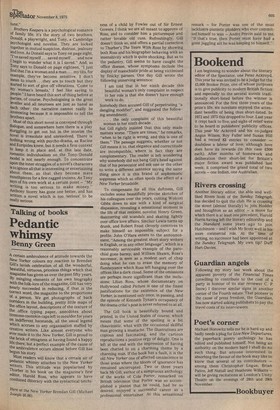Talking of books
Pedantic Whimsy
Benny Green
A certain ambivalence of attitude towards the New Yorker colours my reaction to Brendan Gill's lavish celebration of all the wonderful, beautiful, virtuous, priceless things which that magazine has given us over the past fifty years. BY mingling elements of his own biography With the folk-lore of the magazine, Gill has very nearly succeeded in reducing, if that is the correct word, the magazine to the proportions of a person. We get photographs of back Corridors in the building, pretty little maps of the office layout, descriptions of the texture of the office typing paper, anecdotes about tiresome coonskin caps left to moulder for years Ott indifferent hatstands, all the usual legend Which accrues to any organisation staffed by creative writers. Like almost everyone who ever made it to the New Yorker, Gill is proud to the brink of smugness at having found a happy life there; but a perfect example of the cause of the ambivalence occurs almost before Gill has begun his story.
Most readers will know that a certain air of Pedantic whimsy attaches to the New Yorker writers. This attitude was popularised by Thurber in his book on the magazine's first editor, Harold Ross, who appears to have combined illiteracy with the syntactical tetchi
ness of a child by Fowler out of Sir Ernest Gowers. I think we are all meant to approve of 'Ross, and to consider him a picturesque and rather lovable old cuss. Refreshingly, Gill doesn't think so, and offers a partial corrective to Thurber's The Years With Ross by showing both Ross and his biographer behaving with an insensitivity which is quite shocking. But as to the pedantry, Gill seems to have caught the office disease, whose symptoms include the display of masochistic pride at being victimised by finicky parsers. One day Gill wrote the following unnerving sentence:
I am told that in her ninth decade this beautiful woman's only complaint in respect to her role is that she doesn't have enough work to do.
Somebody then accused Gill of perpetrating "a dangling modifier", and suggested the following amendment: . . . the only complaint of this beautiful woman in her ninth decade . , .
but Gill rightly insisted that this only made matters worse. "There are times," he remarks, "when to be right is wrong, and this is one of them." The passage suggests, whether or not Gill means it to, that elegance and correctitude are incompatible, where in fact they are complementary. The reader is left wondering why somebody did not bang Gill's head against that of his persecutor and ask one or the other to write a different sentence saying the same thing since it is this brand of sophomoric soppiness which so often spoils the effect of a New Yorker broadside.
To compensate for all this daftness, Gill includes some beautifully precise sketches of his colleagues over the years, cutting Wolcott Gibbs down to size with a kind of surgical dispassion, revealing a sensational moment in the life of that reticent novelist Henry Green, disinterring old scandals and skating lightly over office love affairs. Sinclair Lewis turns up drunk, and Robert Frost cleverly contrives to make himself an impossible subject for a profile. John O'Hara enters to the announcement, "Among the greatest short story writers in English, or in any other language", which is a reasonabiy serviceable example of the parochial gone barmy, and William Shawn, Ross's successor, is seen as a modest sort of chap doing what he can to erase the memory of flamboyance which Ross left hanging over the offices like a dark cloud. Some of the omissions are perhaps more significant than the inclusions; Lilian Ross, whose documentary on Hollywood called Picture is one of the finest justifications for the existence of the New Yorker, is mentioned only once, in passing, and the episode of Kenneth Tynan's occupancy of the drama critic's post is never referred to at all.
The Gill book is beautifully bound and printed, in the United States of course, which means that some of the spelling is a bit chauvinistic, what with the occasional skillful man growing a mustache. The illustrations are copious and fascinating, and the cartoon reproductions a positive orgy of delight. One is left at the end with the impression of having been chatted to on a 'charming theme by a charming man. If the book has a fault, it is the old New Yorker one of affected omniscience in those areas where the bloom of ignorance has remained uncorrupted. Two or three years back Mr Gill, author of a sumptuous anthology of the works of Cole Porter, remarked on British television that Porter was so accomplished a pianist that he could, had he so desired, enjoyed a successful career as a professional entertainer. At this sensational
remark — for Porter was one of the most lacklustre pianistic plodders who ever committed himself to wax — Andre Previn said to me, "If that's true, then Porter must have had a great juggling act he was keeping to himself."
































 Previous page
Previous page